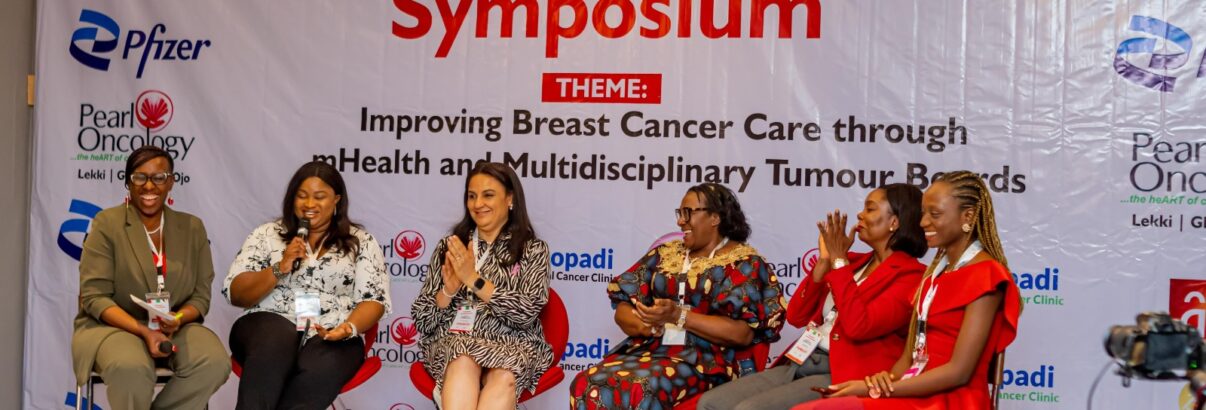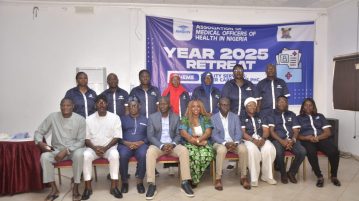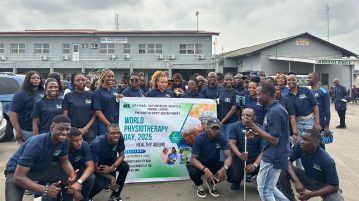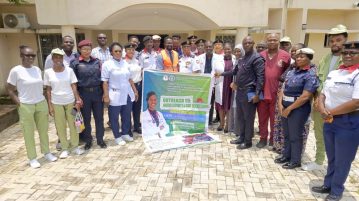About a month ago, the breast cancer symposium themed, “Improving Breast Cancer Care through mHealth and Multidisciplinary Tumor Boards” was organized by Pearl Oncology on the 11th of January 2023. At this event, which held at the Nnamdi Azikiwe Hall of Radisson Blu Hotel Ikeja, there were over two hundred dignitaries – including healthcare professionals, cancer researchers and industry leaders – present both in person and virtually.
In the opening remarks of the symposium by Cynthia Eze – Clinical Administrator at Pearl Oncology Clinic, she appreciated the efforts of partners and other organizers that have contributed immensely to make this first meeting of its kind a success. She further gave a summary of activities that will occur during the symposium and enjoined participants to actively engage, network and meet colleagues, while having a great time. Following this, Queen Ikwuakam – a breast cancer survivor and advocate – took to the stage and gave an account of her journey through cancer diagnosis, care and survivorship. She narrated her unique experience as a single mum who battled with cancer and had to deal with the fear of uncertainties. And then urged healthcare workers to also pay attention to other concerns of their patients including their psychological issues and financial challenges.
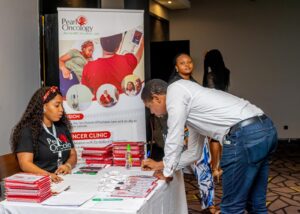
During the first presentation titled, “Harnessing mHealth in Psycho-oncology”, by Dr Taiwo Adeleke, a Clinical Oncologist at University College Hospital, Ibadan; he highlighted different studies from Sub-Saharan Africa that reviewed the psychosocial issues faced by patients with a cancer diagnosis. Citing recent patient encounters, he shared how during clinic visits, he has used psychological interventions to address those identified psychosocial issues. He also discussed the current use of mHealth (via the Oncopadi App) as a tool to identify and address psychosocial issues in patients. He however concluded his presentation by describing challenges with adapting mHealth in the psycho-oncology care and discussed prospects for its growth and expansion.
The next presentation taken by Dr Omolola Salako (Clinical Oncologist/CEO, Pearl Oncology) was titled, “Pearl Oncology’s efforts and vision on increasing access to quality breast cancer care”. During this session, she described the vision that birthed Pearl Oncology and emphasized on the fact that breast cancer is a national health crisis, as it accounts for 23% of all cancer cases in Nigeria. She also demonstrated a four-fold rise in the breast cancer incidence in Nigeria over the past 50 years. Further pointing out that, “however, the growth of infrastructure and oncology personnel in the region have not been able to meet up with the rising burden”. She then explained how these factors alongside the aggressive tumor biology in women of African descent are responsible for the high mortality rate in Nigeria. After which she highlighted that to address these challenges, Pearl Oncology clinic currently operates in three locations across Lagos state. And they use a multidisciplinary approach to provide comprehensive care for patients with cancer, while supporting other hospitals in Lagos by sharing clinical resources and manpower. Clearly reinforcing that Pearl Oncology’s goal is to improve breast cancer outcome in Nigeria by providing high-quality and affordable cancer care across different locations.
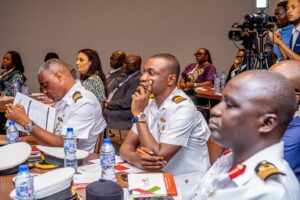
Dr. Olayemi Dawodu, Clinical Pathlogist and CEO of Clina-Lancet Laboratories Nigeria, delivered an enlightening overview of “Pathologic diagnosis of Breast Cancer and Immunohistochemistry testing”. After summarizing the context of the current burden of breast cancer, Dr. Olayemi Dawodu discussed the role of a histopathologist in the management of breast cancer including making a diagnosis, prognostication, provision of epidemiological updates, and coordination of cancer registries. Likewise, common procedures for obtaining samples including Fine Needle Aspiration Cytology, Core Biopsy, and Excision were highlighted, with the necessary precautions to be taken when obtaining these samples emphasized. Dr. Olayemi Dawodu also described immunohistochemistry staining techniques of breast tissue samples and the reporting of results. She narrated the current advances in tissue staining and identified new biomarkers whose presence have implication for clinical management of breast cancer.
Dr Adewumi Alabi, a consultant clinical oncologist at NSIA-LUTH Cancer Centre presented an overview of the management of advanced breast cancer. Re-establishing that advanced breast cancer includes stage 3b and stage 4 and could presently clinically with ulceration, pain, bleeding, or a fungating mass. She highlighted that there has been an increase in the available options for the management of advanced cancer, and described how targeted therapy has revolutionized treatment outcomes in advanced breast cancer. As well as the multiple benefits of radiotherapy in its management, such as downstaging tumors, reduction of tumor burden and as an adjuvant. She emphasized that if we are going to replicate the increasing cancer survival seen in high income countries, we must work towards early disease detection and initiation of treatment.
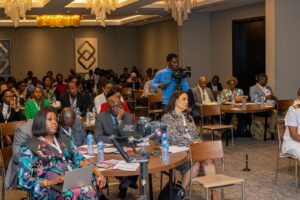
In a follow-up session, Dr Mutiu Jimoh, a consultant clinical oncologist at the University College Hospital presented two case studies of patients with advanced breast cancer who achieved progression-free status when managed with Palbociclib. He drew attention to the risk of financial toxicity which could result from patients paying out-of-pocket and made a passionate appeal to stakeholders to explore novel measures to ensure that this drug is affordable to as many patients that will likely benefit.
The afternoon session commenced with the presentation of findings from the Mechanisms of Established and Novel Risk Factors in Women of African Descent (MEND) study which compared data from over 300 breast cancer cases and controls. This was done by Anjali Gupta, a postdoctoral research fellow who worked on the study with the billed presenter – Tomi Akinyemiju, a Professor of Epidemiology and Medical Oncology at Duke University.
Then, the much-anticipated Women-in-oncology panel session kicked off with Dr Omolola Salako moderating the panellists. They include Dr Lillian Ekpo, Director of NSIA-LUTH cancer center; Mrs. Clare Omatseye, Founder/MD of JNC International; Dr Adedayo Joseph, Research Program Director at NSIA-LUTH Cancer Center; Dr Anthonia Sowunmi, Clinical Oncologist at NSIA-LUTH Cancer Center and Oluwatomiwa Obielodan, Program Coordinator at Sebeccly Cancer. Some of the themes addressed during this session were the power of mentorship, thinking “glocally” by adapting globally recognized best practices and applying it to challenges locally. Dr Sowunmi discussed the challenges she faced as a pioneer female trainee in clinical oncology- a male dominated specialty. Using personal accounts, Dr Joseph emphasized the importance of having a supportive partner and investing in oneself. Increasing the role of women in administration was addressed by Dr Lillian Ekpo, who expressed her hope of a better tomorrow – where gender will not matter during a selection process.
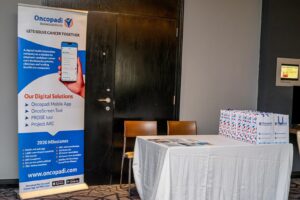
Dr Babatunde Adeteru, Consultant Surgeon delivered a presentation on the unique collaboration between Oncopadi Technologies and Olabisi Onabanjo University Teaching Hospital, Sagamu. He informed the audience that despite the volume of advanced cancer cases seen at his center, there is no cancer specialist in the hospital. “The establishment of a Virtual Tumor Board by the help of the Oncopadi team was the actualization of a long-term vision for OOUTH, as it has significantly improved the quality of care available to cancer patients”, he said. The tumor board meeting which is usually chaired by the clinical oncologist operating remotely allows for the in-depth discussion of breast cancer cases among relevant specialists and treatment decisions are made with the NCCN guidelines. He highlighted other advantages of the virtual tumor board such as provision of easy access to specialists at a relatively low cost. Alongside some challenges which include logistics, shortage of operational personnel, and concerns about its sustainability. However, recommendations generated at the end of this session include finding innovative ways to generate funding to sustain the program and broadening the range of patients catered for.
Other presentations in the afternoon session include a multidisciplinary panel that discussed the care of a patient with advanced breast cancer presenting after 15 years with a re-occurrence and an industry session by Pfizer. Mr Ayorinde Akanbi, the country brand lead at Pfizer summarized findings from the Paloma-2 study which is a double blinded, phase-3 randomized controlled trial that demonstrated the clinical benefit of combining Palbociclib with Letrozole in the management of women with ER-positive, HER2-negative advanced breast cancer. He emphasized that this combination which is marketed by Pfizer under the brand name Ibrance™ is available in Nigeria and its safety and efficacy in Nigerian women is well documented. In a follow-up session, Dr Muhammad Abdulkarim, the Pfizer Senior Market Access Manager discussed the availability of Access Programs which are geared towards Ibrance and other cancer drugs more affordable to Nigerians.
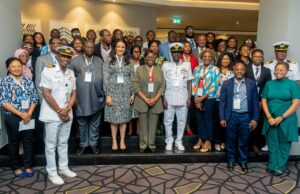
Dr Adaorah Enyi, the Chief Operating Officer of Oncopadi Technologies Ltd delivered the final presentation for the symposium titled, “Developing Cancer Technologies for LMICs”. Here, she summarized the mobile health technologies that have been developed by Oncopadi Technologies to address the burden of cancer in Nigeria. Technological solutions such as Oncopadi – an application available on the web and google play store, Project ARC – a virtual tumor board which has been piloted in Southwest Nigeria and PROSE – a tool that allows for the patient self-reporting of side effects in order to reduce the number of treatments drop-outs were all discussed during this presentation.
In conclusion, the vote of thanks was given by the Chief Medical Director of the Nigerian Navy Reference Hospital, Ojo. And other participants recognised at symposium were Consultants from the University College Hospital, Ibadan (Drs Ayorinde Folasire, Yemisi Folasire, and Foluke Sarimiye); Renowned Oncologists from NSIA-LUTH Cancer Center, University of Benin Teaching Hospital, and University of Ilorin; as well as representatives from the Oncology Interest Group Nigeria, Sebeccly Cancer Center, and the Nigeria Navy Reference Hospital-Ojo team led by the Chief Medical Director.
![]()
![]()

Editor’s note:
This event report was written by Okwunze Kenechukwu and Olapade Paul.

